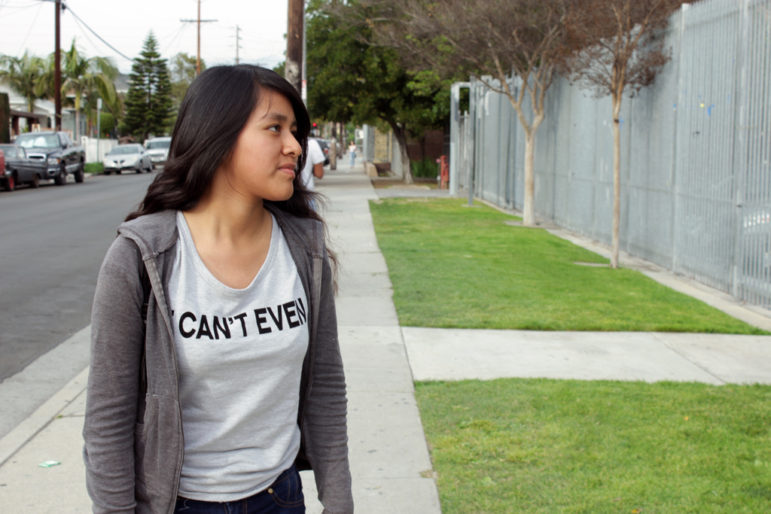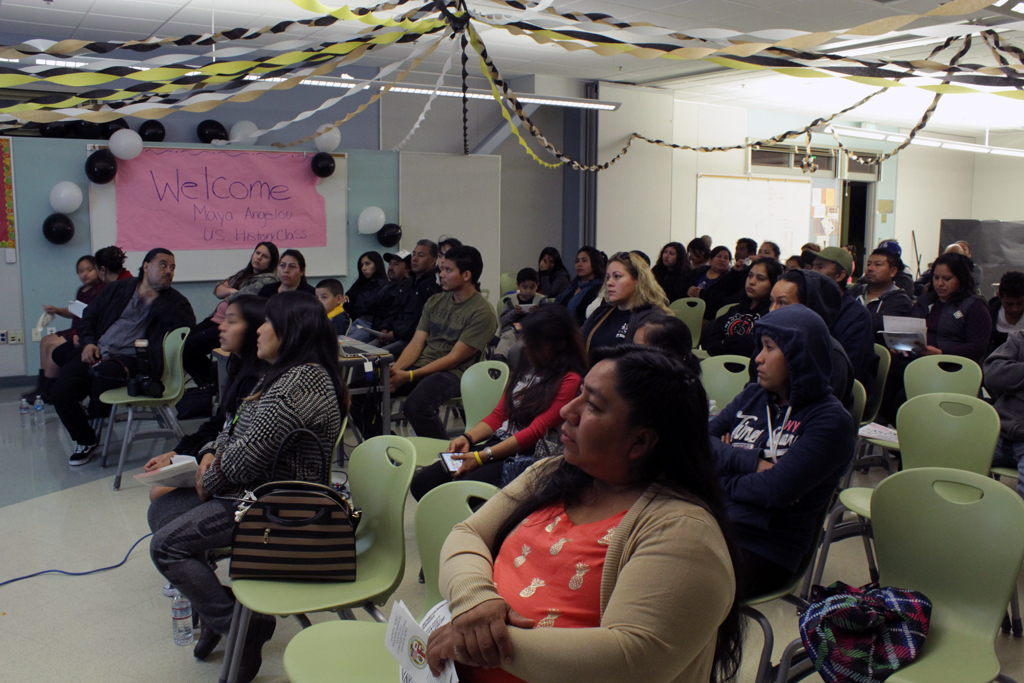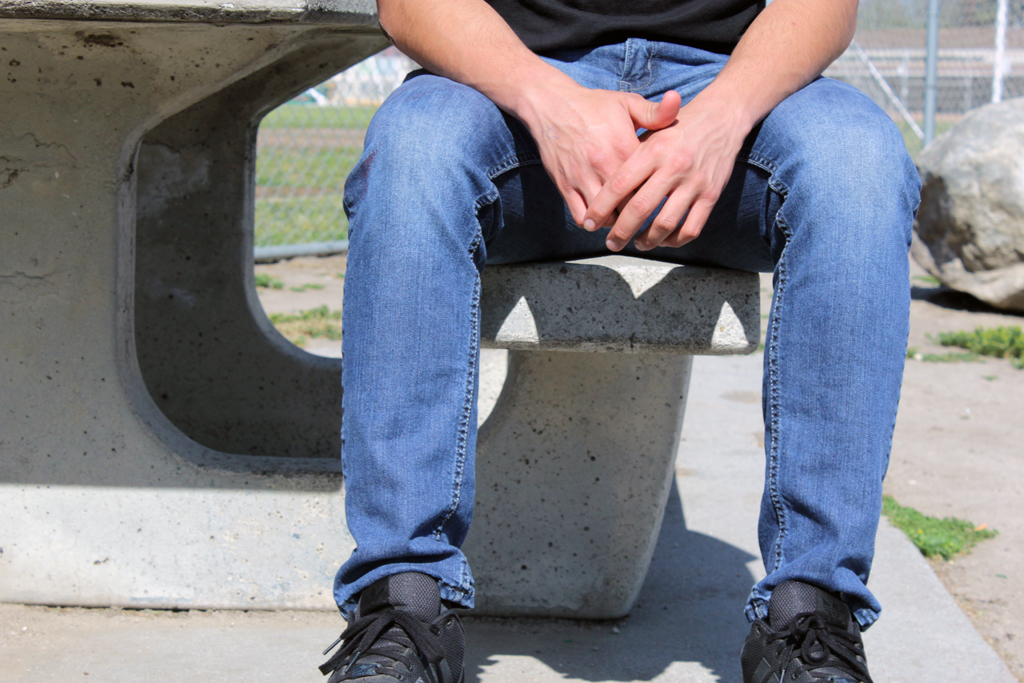LOS ANGELES — For 17-year-old Alejandro, dealing with anxiety has been a normal part of teenage life.
First, it was about his father — a farmworker who was killed while protesting corruption in his hometown of Michoacán, Mexico. Then, the news that his immigration case was closed after two years in the U.S. seeking asylum. Now, a looming crackdown on illegal immigration has him on edge, fearing for his future and that of his mother and younger brother.

“I used to be a lot more relaxed, but after our case was closed there was some uncertainty. And now that [President] Trump is in power I feel it even more,” said the senior at Dr. Maya Angelou Community High School in South Los Angeles. “It’s like a fear and impotence, and I can’t do anything about it.”
According to advocates, educators and health providers, young people’s experiences since the presidential campaign has impacted their mental health, affecting their quality of life.
Not a new challenge
Stress and its impact is nothing new for young immigrants. Alma Leyva, health initiatives program manager at the Dream Resource Center of the UCLA Labor Center, conducted a statewide study — the first of its kind “by and about immigrant youth in California,” according to the organization — to study how the fear of deportation impacts the mental health of undocumented young people.
Published in 2015, the report surveyed 550 mostly Latino immigrant young people in California and found that 83 percent of them were practicing intense self-surveillance and modifying their behavior to avoid law enforcement.
“Some of the narratives that we heard [in our research] was folks being afraid to leave their house or being fearful of police and different enforcement agencies and living with high anxiety,” said Leyva.
While the study was conducted prior to the presidential election, Leyva says it paints a picture of the issues immigrants have long been facing and notes fears have intensified in recent months. This constant need to monitor, says Leyva, can negatively impact their mental and emotional wellness.
“It’s something that is really ingrained in people, particularly in immigrant youth, to the point where it’s highly normalized, like, ‘this is what we have to do because we’re undocumented,’” she said.
Deportations are nothing new. According to the U.S. Department of Homeland Security data, between 2009 and 2015 more than 2.5 million people were removed through immigration orders; another 344,354 were removed in 2016.
However, President Donald Trump’s promise to aggressively ramp up deportations has spread fear among immigrant communities, and for many, that only increased after the nearly 700 arrests* by Immigration and Customs Enforcement (ICE) in February, including 160 across Southern California.
Maribel Rosas, 17, a U.S.-born citizen whose parents have been living in the country illegally for more than two decades, said fears about her family being broken up by deportation started recently.
After watching a viral video of a father getting arrested by ICE as he was dropping his daughters off at school just a few miles from her neighborhood, that fear became all too real.
“That could’ve been me or my cousin,” Rosas said. “My dad drops me off at school in the morning.”
This school year, Rosas joined Movimiento Estudiantil Chicanx de Aztlán (M.E.Ch.A.), a student-led club at school that focuses on Chicano unity and political action, where she’s learned how to take action on immigration and civil rights issues affecting Latinos in her community.
She also launched a research project to measure if students’ fears regarding deportations have increased since President Trump was elected.
Rosas doesn’t currently seek help or counseling to deal with stress, but she says learning about the immigration system and seeing her peers stand up as activists helps her become more aware of people’s legal rights.

Maribel Rosas, a student at Roosevelt High School in Boyle Heights, says fears that her parents could be deported became heightened after the presidential election.
New know-your-rights training
Alma Catalan, an academic counselor at Kid City Hope Place in downtown Los Angeles, says she’s seen the surge of fear among the children and young people she works with. But she’s also seen an interest in immigration information and resources.
Ninety-five percent of students involved in the college access and leadership development program are Latino — some of whom are living in the country illegally and many of whom are children of undocumented immigrants.
“After the elections, many of [our students] were really stressed about the climate and were wondering what would happen if ICE came to their house,” Catalan said.
The center she’s worked at for three years has strongly focused on helping kids get to college. But recently, her days have been filled with more than just helping students fill out college and financial aid applications.
“Trainings around immigration issues have definitely increased,” Catalan said. “Now it’s come to the point where we have to come up with know-your-rights workshops or build a rapid-response team and make sure we talk to students and provide them with the most accurate information without scaring them.”
While students turn to counselors for support, she says the nonprofit organization’s staff cannot provide the therapy some may need, so the center brings in social workers and faith-based leaders, and refers their students to outside resources for help with mental wellness.
“We do this because there’s a need,” Catalan added.

Parents and community members attend a know-your-rights workshop organized by students at Maya Angelou Community High School in South Los Angeles on March 1, 2017.
Access to mental health care
That need for mental health access was also outlined in Leyva’s research. Only about one-fourth of participants had access to counseling services, and less than one-third had access to emotional wellness services.
Roderick Shaner, medical director of the Los Angeles County Department of Mental Health, said because most undocumented immigrants are ineligible for federally funded health services, it may be a hardship to access safety-net programs provided by various counties in California.
“For undocumented individuals, it is more challenging to find professionals who have the linguistic and cultural skills that would be ideal to treat clients in some cultures,” Shaner said.
Many of his clinicians have seen symptoms of stress and anxiety increase in clients since the presidential campaign, and while it’s an experience happening across the nation, he said, “Los Angeles and certain other areas are perhaps most impacted because of the high prevalence of undocumented residents.”
Shaner also points to a cultural resistance to acknowledging mental illness and the distrust some undocumented people face when seeking social or governmental services.
That’s why, Leyva said, there’s an urgent need for resource centers, community organizations, schools and sanctuary stations to provide support, counseling services and healing circles.
“We’re very fortunate to be in California where there are more protections for undocumented folks compared to other states,” said Leyva. “We can really serve as a model for the rest of the nation to support and stand behind the immigrant community … but there’s still a lot of work to do.”
***
Jessica Perez trains students in community reporting as a fellow at the USC Annenberg School of Journalism.































